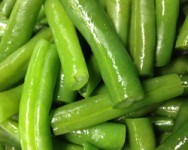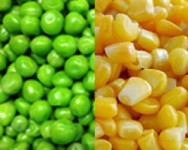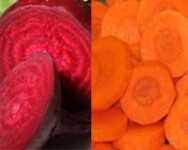2020 NYS Processing Vegetable Advisory Meetings
We are holding the processing commodity advisory meetings virtually on Zoom since we are not able to hold an in-person meeting this year due to COVID-19 safety restrictions. On Tuesday, December 15, the snap bean meeting will be held in the morning, with the pea and sweet corn meeting in the afternoon. The beet and carrot meeting will be held the morning of Wednesday, December16. You can log-in with the same Zoom link for any or all sessions. The meetings will cover a review of the 2020 growing season, reports of funded projects, and discussion of research priorities for the coming year.
Cost: FREE!
Pre-registration is required. Registration will grant you access to all three sessions/meetings. After you register, you will receive an email a few days before the conference with a link to connect to the conference via Zoom. REGISTER HERE NOW
The conference will be held using an online videoconferencing platform called Zoom. Don't have Zoom? Sign up for free at Zoom and click on "Sign Up, It's Free"
DEC credits are available. In order to receive DEC credits, you have to pre-register, enter your DEC ID number AND upload a photo of your DEC ID license (or email a picture or photocopy of your DEC ID license to Julie Kikkert at least 1 day prior to the event). You can only receive credit if BOTH of those are submitted and match. It is also required to have your Zoom log in name match the name on your DEC ID. If you need to change your name in Zoom, hover over your window and click on the three (•••) dots in the upper righthand corner. Select "rename" to change your screen name displayed.
CCA credits are also available after each talk. Please download the certified crop advisor app prior to the conference
Event Details
Date
December 15, 2020
Time
8:30am participants log-in and roll-call for DEC and CCA credits; 9:00am - 10:30am meeting
Location
via Zoom
Cost
FREE!
Host
Cornell Vegetable Program and Cornell AgriTechJulie Kikkert
585-313-8160
email Julie Kikkert
Snap Bean Advisory

Processors and growers of snap beans are invited to this FREE online meeting to review the 2020 season and comment on pests and other issues that were encountered. Reports of the 2020 research projects funded by the New York Vegetable Research Association/Council will be given. A group discussion period will include the review of research priorities for the coming year. 0.75 DEC credits in categories 1a, 10, and 23 will be offered.
SNAP BEAN ADVISORY AGENDA
9:00am Meeting Begins
- Processors Report on the 2020 Snap Bean Growing Season
- Recap of Insect, Disease, and Weed Problems Encountered in Snap Beans in 2020 -- Julie Kikkert, CCE Cornell Vegetable Program
- Processing Snap Bean Variety Trial -- Michael Rosato, Cornell
- Weed Management in Snap Beans: 2020 Research and Future Plans -- Lynn Sosnoskie, Cornell
- Group Discussion Period moderated by Julie Kikkert, CCE Cornell Vegetable Program
10:30 AM DEC and CCA Credit Check Out and Meeting Adjourn
Event Details
Date
December 15, 2020
Time
1:00pm participants log-in and roll-call for DEC and CCA credits; 1:30pm - 3:00pm meeting
Location
via Zoom
Host
Cornell Vegetable Program and Cornell AgriTechJulie Kikkert
585-313-8160
email Julie Kikkert
Green Pea and Sweet Corn Advisory

Processors and growers of green peas and sweet corn are invited to this FREE online meeting to review the 2020 season and comment on pests and other issues that were encountered. Reports of the 2020 research projects funded by the New York Vegetable Research Association/Council will be given. A group discussion period will include the review of research priorities for the coming year. 1.0 DEC credits in categories 1a, 10, and 23 will be offered.
GREEN PEA AND SWEET CORN ADVISORY AGENDA
1:30 PM Meeting Begins:
- Processor Report on the 2020 Green Pea and Sweet Corn Seasons
- Recap of Insect, Disease, and Weed Problems Encountered in Peas and Sweet Corn in 2020 -- Julie Kikkert, CCE Cornell Vegetable Program
- Evaluating Insecticide Programs for Corn Earworm in Sweet Corn Production -- Brian Nault, Cornell
- Processing Pea and Sweet Corn Variety Trials -- Michael Rosato, Cornell
- Group Discussion Period moderated by Julie Kikkert, CCE Cornell Vegetable Program
3:00pm DEC and CCA Credit Check Out and Meeting Adjourn
Event Details
Date
December 16, 2020
Time
8:30am participants log-in and roll-call for DEC and CCA credits; 9:00am - 11:00am meeting
Location
via Zoom
Host
Cornell Vegetable Program and Cornell AgriTechJulie Kikkert
585-313-8160
email Julie Kikkert
Beet and Carrot Advisory Meeting

Processors and growers of beets and carrots are invited to this FREE online meeting to review the 2020 season and comment on pests and other issues that were encountered. Reports of the 2020 research projects funded by the New York Vegetable Research Association/Council will be given. A group discussion period will include the review of research priorities for the coming year. 1.0 DEC credits in categories 1a, 10, and 23 will be offered.
BEET AND CARROT ADVISORY MEETING AGENDA
9:00am Meeting Begins:
- Processor Report on the 2020 Carrot and Beet Growing Season
- Recap of Insect, Disease, and Weed Problems Encountered in Beets and Carrots in 2020 -- Julie Kikkert, CCE Cornell Vegetable Program
- Weed Management in Beets and Carrots: 2020 Research and Future Plans -- Lynn Sosnoskie, Cornell
- Beets: Early Season and Root Disease Control -- Eric Branch, Cornell
- Beets: Growth Regulator Trial -- Sarah Pethybridge, Cornell
- Carrots: Growth Regulator Trial -- Sarah Pethybridge and Sean Murphy, Cornell
- Group Discussion Period moderated by Julie Kikkert, CCE Cornell Vegetable Program
11:00am DEC and CCA Credit Check Out and Meeting Adjourn

Upcoming Events
Orleans Regional Winter Vegetable Meeting
February 9, 2026
Albion, NY
Topics include: Breeding and evaluating tomatoes to control disease and improve yield, jar testing and ensuring spray water quality, breaking down organic matter, FSMA updates and Q&A with Ag & Markets, and industry updates. Includes hands-on learning, coffee break, and sponsor booths.
DEC credits available: 1.0 in CORE plus 0.5 in 1a, 10 or 23
African Eggplant Participatory Breeding Kick-Off
March 5, 2026
Join us to learn about the Cornell African Eggplant Research Project and learn how you can participate! African eggplant, also known as Bitterball, Garden Egg, Kittley and other names, is an important crop for many members of our community with heritage from regions such as sub-Saharan Africa, Southeast Asia, and Brazil. Since 2024, the Cornell African Eggplant Research Project has been collaborating with growers and community partners across New York to develop high-quality varieties adapted to the Northeast U.S. In this meeting, we will share information about growing and preparing African eggplant, highlight our research to date, and invite partners to collaborate with us in our 2026 participatory breeding and variety selection efforts.
COST: FREE! You must pre-register to receive the Zoom link.
Managing the Invasive Swede Midge Webinar
March 6, 2026
Swede midge is an invasive fly that causes serious economic losses to brassica crops. Due to its small size and hidden feeding habits, swede midge is often called an "invisible pest" and damage may be misdiagnosed. In this webinar, we will review the swede midge life cycle and crop damage symptoms, current management recommendations, new research findings, and highlights from on-farm case studies with a focus on organic management.
1.75 DEC pesticide recertification credits in categories 1a, 10, and 23.


































